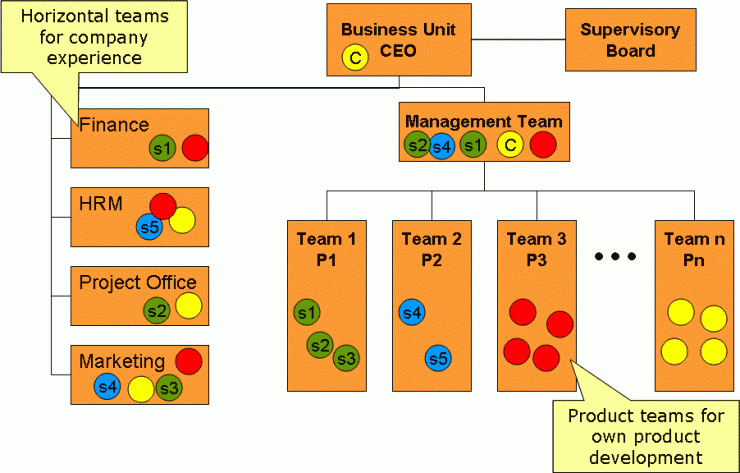Educational Concept
Educational concept
How to educate Entrepreneurship in ICT?
The educational concept of Netherware was born when Sjaak Brinkkemper was appointed as a part-time professor in Product Software at de Vrije Universiteit in Amsterdam. Traditional lecturing is boring, counterproductive, and a major reason for the low diploma output of universities. After two years Sjaak was appointed at Utrecht University, and Netherware was expanded and established as an ICT incubator for students. In Netherware, students develop their own company from a one paragraph idea, to a fully running start-up with a prototype and a business plan.
The ICT-Entrepreneurship course in the MBI program at Utrecht University is based on the experiences on authentic learning where students perform assignments in a student-run company. Upon signing-in for the course, students are required to submit an original and viable idea for a software product or service. We don’t want yet another advertisement run web-portal, but we are looking for the next Skype, SAP or TomTom. Students may form their own team in size between one and four and work on their own product idea, in a so-called product team.

We form student companies of about 9 to 12 students and the students choose roles according to their capabilities and ambitions:
- Finances: to do the bookkeeping as if it was a real company with paying rent, leasing hardware, and salaries
- HRM: for all personnel affairs including the intranet and social events
- Project Office: for all paper work and assignment documentation
- Marketing: for the websites, logos, presentation templates and the like
- CEO: one student to run the company
In these so-called horizontal teams the students experience what it is like to work in a company and to share responsibilities. On a sidenote, the income of the companies is a fictitious amount of money, which is calculated dependent on their grades for the assignments. Of course, poor grades put the company in red figures.
Netherware has a Supervisory Board that consists of very experienced ICT entrepreneurs, fund managers of venture capital, and ICT journalists. Half-way through the course, the Supervisory Board comes for the mid-review, during which they provide comments and suggestions on the ideas and business concept. At the end of the course (after 10 weeks in Utrecht) the Supervisory Board judges the final products and business plans presented by the student teams in a grand finale. The best products and best performing students get awards during the End Review ceremonies.
After the course, several student teams decide to continue with their business idea. Over the years about 30 companies were started by students as a result of this course. Below you find some papers we wrote on the topic of ICT entrepreneurship in collaboration with the Educational Research staf of Utrecht University.
We think that education in Entrepreneurship for ICT is essential for the economy, but above all exciting and very rewarding. We invite all ICT educators with interests in entrepreneurship to adopt our model, and enjoy.
Sjaak Brinkkemper and Slinger Jansen
References
- Nab, J., Pilot, A., Brinkkemper, S., & Berge, H. ten. (2010). Authentic competence-based learning in university education in entrepreneurship. International Journal of Entrepreneurship and Small Business 2010 – Vol. 9, No.1 pp. 20 – 35.
- Brinkkemper, S. (2003). Ondernemen in software: onderzoek en onderwijsprogramma over productsoftware. Informatie (Special Issue on Product Software), 45(9), 22-25.
- J. Nab, S. Brinkkemper, H. ten Berge, and A. Pilot (2006). Netherware: The effects of a synthesis of a course, incubator and coaching facility. In D. Remenyi, editor, Proceedings of the European Conference on Entrepreneurship and Innovation, pages 143–150, Reading, UK. Academic Conferences Limited.
- J. Nab, A. Pilot, S. Brinkkemper, and H. ten Berge. Authentic competence-based learning in university education in entrepreneurship. In Conference Proceedings IntEnt2007, Gdansk, 2007. University of Technology.
- H. ten Berge, J. Nab, and S. Brinkkemper. Netherware: analyse van de opzet, resultaten en succes- en faalfactoren. Rapportage EMP-project 2005-2006. Technical report, IVLOS, Universiteit Utrecht, Utrecht, 2006.
- H. ten Berge, A. Pilot, S. Brinkkemper, and S. Ramaekers. Ondernemerschap aanleren in een fictief bedrijf bij informatiekunde. In M. Valcke, K. De Cock, D. Gombeir, and R. Vanderlinde, editors, Meten en onderwijskundig onderzoek, pages 369–371, Gent, 2005. Universiteit Gent – Vakgroep Onderwijskunde.
- H. ten Berge, S. Ramaekers, S. Brinkkemper, and A. Pilot. An authentic task in an informatics course in higher education. In C. Constantinou, D. Demetriou, A. Evagorou, M. Evagorou, A. Kofteros, M. Michael, C. Nicolaou, D. Papademetriou, and N. Papadouris, editors, Integrating multiple perspectives on effective learning environments, pages 160–161, Nicosia, Cyprus, 2005. University of Cyprus.
- H. ten Berge, S. Ramaekers, S. Brinkkemper, and A. Pilot. Netherware: analysis, results, and success factors of the designed curriculum unit. Technical Report 2006-016, 2006.

